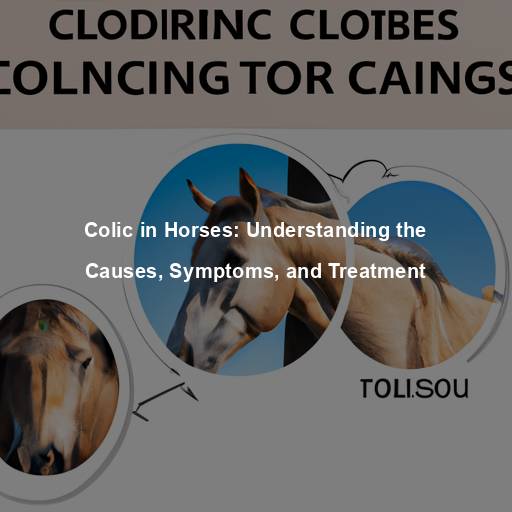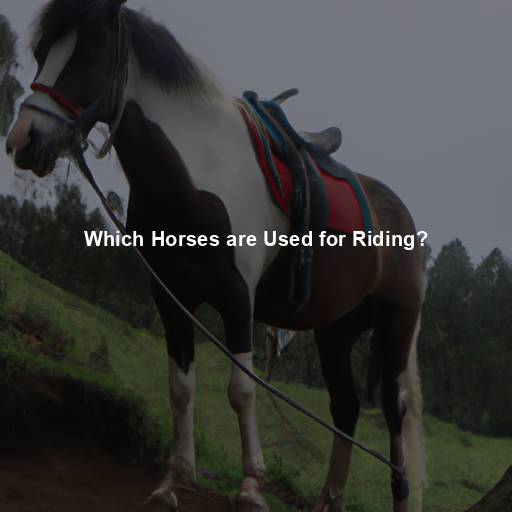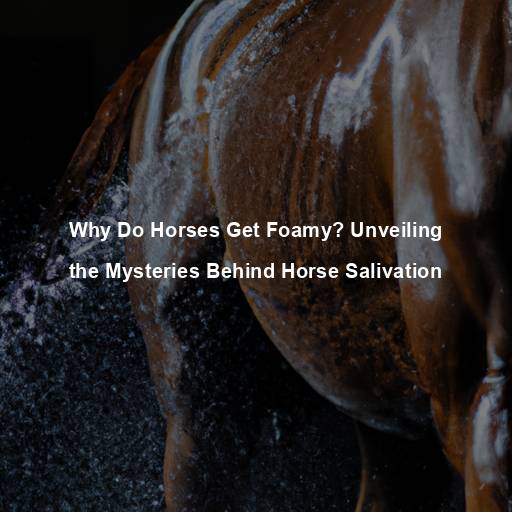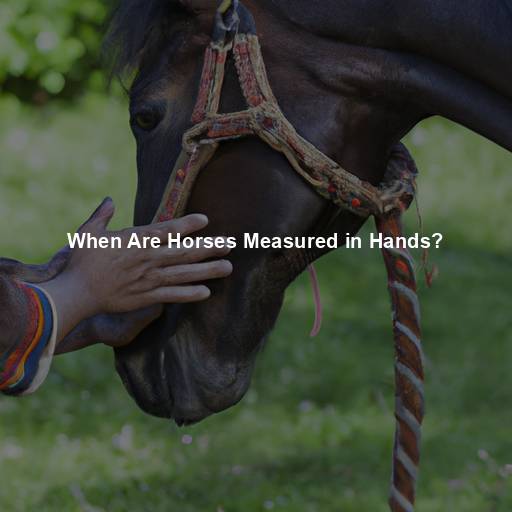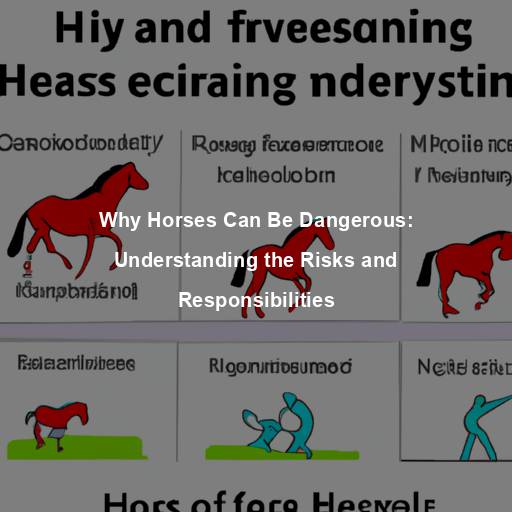Colic in Horses: Understanding the Causes, Symptoms, and Treatment
Last Updated on July 25, 2023 by Evan
Contents
- 1 What is Colic in Horses?
- 2 Causes of Colic in Horses
- 3 Recognizing the Symptoms of Colic
- 4 Treatment and Prevention of Colic
- 4.1 Conservative Management
- 4.2 Surgical Intervention
- 4.3 Prevention is Key
- 4.4 Misconception 1: Colic is always caused by something the horse ate.
- 4.5 Misconception 2: All colic cases require surgery.
- 4.6 Misconception 3: Colic is a one-time occurrence.
- 4.7 Misconception 4: Horses with colic should be fed to keep their guts moving.
- 5 When to Seek Veterinary Care for Colic
- 6 Caring for a Horse Recovering from Colic
- 7 FAQs – Do Horses Get Colic?
- 7.1 What is colic in horses?
- 7.2 How common is colic in horses?
- 7.3 What are the symptoms of colic in horses?
- 7.4 What causes colic in horses?
- 7.5 Can certain horse breeds be more prone to colic?
- 7.6 How can colic be prevented in horses?
- 7.7 What should I do if my horse displays signs of colic?
- 7.8 Can colic in horses be treated?
- 7.9 Are there any long-term complications from colic in horses?
- 7.10 Can colic be fatal for horses?
What is Colic in Horses?
When it comes to equine health, one word strikes fear into the hearts of horse owners everywhere: colic. It’s like a vicious beast lurking in the shadows, ready to pounce on our beloved equine companions with debilitating abdominal pain. The causes of this torment can be as elusive as a fleeting breeze or as menacing as an invisible predator, leaving us bewildered and perplexed. From mild tummy troubles to sinister obstructions and twisted intestines, colic can quickly escalate into a life-threatening tragedy if not properly understood and addressed.
Types of Colic in Horses
Colic, a perplexing condition, manifests in various forms, each shrouded in its own enigmatic causes and bewildering symptoms. Unlocking this complex puzzle can guide equine enthusiasts on a path of comprehension, enabling them to identify the telltale signs and promptly procure the necessary care from skilled veterinarians.
Gas colic is a widely observed phenomenon among horses that leaves both owners and veterinarians perplexed. This prevalent form of colic occurs when an excessive amount of gas accumulates in the equine digestive system, causing discomfort and distress. Experts suggest that various factors, such as dietary shifts, ingestion of foreign substances like sand or dirt, or even emotional strain, can contribute to the onset of this unsettling condition. Whether it’s the result of a sudden change in diet or the horse’s way of coping with stress, gas colic remains a perplexing issue in the equestrian world.
Impaction colic, a perplexing and worrisome ailment, haunts horses when a perplexing blockage obstructs their delicate intestines. The origins of this enigma can be traced to a range of confounding circumstances – from the horse’s inadequate hydration to the subpar quality of their forage. Even the ingestion of foreign objects adds to the bewildering nature of this condition, leaving both horses and their caretakers in a state of burstiness, desperately seeking answers.
-
Spasmodic Colic: This type of colic is characterized by spasms in the horse’s intestinal muscles. It can be triggered by stress, changes in diet, or even weather changes.
-
Twisted Gut Colic: Twisted gut colic, also known as volvulus, occurs when a portion of the horse’s intestines twists upon itself. This is a medical emergency that requires immediate veterinary intervention.
Causes of Colic in Horses
Understanding the perplexing nature of colic in horses, there exists an array of factors that lend themselves to this mysterious condition. Although identifying its exact cause remains elusive, horse owners must exhibit a heightened sense of awareness to mitigate the risk it poses. By imminent consideration of these influential factors, appropriate measures can be taken to safeguard equine well-being.
Dietary Factors
-
Abrupt changes in diet: Sudden changes in a horse’s diet, especially when transitioning from one type of feed to another, can disrupt the delicate balance of the digestive system and lead to colic.
-
Poor-quality forage: Feeding low-quality hay or forage that is moldy, dusty, or contaminated with foreign objects can increase the risk of impaction colic.
-
Feeding too much grain: Excessive consumption of grain or concentrate feeds can overload the digestive system and increase the risk of colic.
Management Factors
Insufficient consumption of water can lead to an unsettling case of impaction colic, causing a state of perplexity within the horses’ intestines. This confounding situation arises as dehydration hinders the natural movement of the digestive tract, creating more obstacles for the food to continue its passage.
In today’s fast-paced world, it’s easy to fall into a comfortable routine and neglect our bodies’ need for movement. However, little do we realize that this sedentary lifestyle can wreak havoc on our digestive health. The lack of exercise not only slows down our digestive system, leaving us feeling sluggish, but it also puts us at a higher risk of developing colic, a condition that can be both uncomfortable and perplexing. It’s time to break free from our stagnant habits and prioritize physical activity for the well-being of our digestive system.
- Stress and changes in routine: Horses are sensitive creatures, and any significant changes in their environment or routine can cause stress, which may lead to colic.
Other Factors
Parasite infestation can wreak havoc on the delicate balance of the digestive system, leading to a vexing array of colic-related issues. These pesky invaders have a way of throwing everything into disarray, leaving horses and their caretakers perplexed and searching for solutions. The disruptive impact of heavy parasite burdens seems to be an ever-present enigma, constantly leaving us with more questions than answers.
When it comes to our equine companions, dental complications can crop up out of the blue, leaving their ability to chew and digest food in disarray. Be it jagged edges or fractured teeth, these pesky predicaments can lead to a world of hurt for our trusty steeds, putting them at a disturbingly heightened peril of colic. It’s a perplexing puzzle that demands immediate attention and expert horse dentistry to restore their oral health and ensure their well-being.
Recognizing the Symptoms of Colic
Recognizing the early indications of colic can be a lifesaver, quite literally, for our equine companions. The perplexing array of symptoms can leave even the most experienced horse owners scratching their heads. From restless pawing to bouts of abdominal discomfort, it’s a burst of chaos that demands swift veterinary action. Familiarizing oneself with these telltale signs is key to ensuring the well-being of our beloved horses.
When horses experience discomfort, they often resort to repetitive actions like pawing at the ground or kicking their abdomen in an attempt to find relief. It’s a perplexing behavior that leaves owners and caretakers puzzled about the underlying cause of their equine companion’s distress. Observing these gestures, it becomes clear that horses have their own distinct ways of communicating their discomfort, leaving us with a burst of curiosity to unravel the mystery behind their actions.
When horses are plagued with colic, they often find themselves in a state of confusion and discomfort, leading them to engage in perplexing behavior. One such behavior is their inclination to roll onto their backs or make repeated attempts to do so. This burst of activity is a perplexing sight to witness, as it highlights the distress and discomfort they are experiencing.
In the realm of equine health, a perplexing predicament can arise when a mighty steed displays an unexpected lack of interest in its usual gustatory delights, or worse yet, stubbornly refuses to partake in the ritual of feasting altogether. This enigmatic phenomenon, known as colic, can leave horse enthusiasts utterly puzzled as they grapple with the perplexing question of what has befallen their noble companion’s appetite. So, should you find yourself contending with an equine culinary conundrum, rest assured that you are not alone in your quest to decipher this mysterious lack of hunger.
Restlessness and unease can manifest in our equine companions, as they might engage in restless behavior such as pacing or incessantly shifting positions. These signs of agitation may indicate discomfort or pain that horses are experiencing. Observing these restive tendencies in our majestic creatures can prompt us to take prompt and compassionate action, ensuring their well-being and happiness.
- Increased heart rate and respiration: Colicky horses often have an elevated heart rate and rapid breathing.
One of the key indicators of a horse’s health is the presence of gut sounds, which can reveal any abnormalities or issues within the digestive system. To assess this, veterinarians utilize a stethoscope to carefully listen to the horse’s abdomen, paying close attention to the intensity and frequency of these sounds. The absence or reduction of gut sounds can serve as a perplexing sign, prompting further investigations to unravel the root cause and ensure the horse’s well-being.
If you notice any of these symptoms or have concerns about your horse’s well-being, it is essential to contact your veterinarian immediately.
Treatment and Prevention of Colic
Timely intervention is crucial when dealing with colic in horses. The specific treatment will depend on the underlying cause and severity of the condition. In some cases, mild colic can be resolved with conservative management, while others may require surgical intervention.
Conservative Management
In some instances, when faced with the perplexity of a mild colic episode, veterinarians may recommend implementing a curious approach – temporarily abstaining from feeding your equine companion. This unexpected measure aims to provide the digestive system with a much-needed respite, igniting curiosity about the potential benefits that a momentary pause in nourishment may bring. By embracing this rather unconventional strategy, one might find themselves navigating uncharted waters while seeking solace and relief for their four-legged friend.
-
Medication: Depending on the type of colic, medication may be administered to relieve pain, reduce inflammation, or promote the passage of gas or feces.
-
Fluid therapy: Intravenous fluids may be administered to rehydrate the horse and correct any electrolyte imbalances.
Surgical Intervention
In cases where the horse’s condition does not improve with conservative management or if a surgical emergency such as a twisted gut is suspected, surgical intervention may be necessary. This typically involves exploratory surgery to identify and correct the underlying issue.
Prevention is Key
While some cases of colic are unavoidable, there are steps that horse owners can take to minimize the risk.
To keep your digestive system running smoothly, it’s important to stick to a well-balanced diet and establish a regular eating schedule. By gradually making dietary adjustments and maintaining a consistent feeding routine, you can minimize the likelihood of experiencing digestive disturbances. This approach ensures that your body has the necessary time to adapt to changes, promoting a healthier and happier gut.
-
Provide clean, fresh water: Ensure that your horse has access to clean, fresh water at all times to promote proper hydration and optimal digestion.
-
Feed high-quality forage: Choose high-quality hay or forage that is free from mold, dust, or foreign objects.
-
Implement a regular deworming program: Consult with your veterinarian to develop a deworming schedule tailored to your horse’s needs.
When it comes to keeping your pearly whites in tip-top shape, nothing beats the power of regular dental check-ups. These routine examinations and floating sessions are like the secret sauce to ensuring your teeth are always ready to tackle any chewing challenge that comes their way. Plus, by addressing any dental quirks along the way, you’ll be paving the path towards a smoother digestion journey that will leave you feeling perplexingly refreshed.
- Encourage regular exercise: Regular exercise not only helps keep horses physically fit but also promotes a healthy digestive system.
Misconception 1: Colic is always caused by something the horse ate.
Colic in horses is a complex condition that can leave both equestrians and veterinarians puzzled. Although diet can play a role, it’s crucial to understand that colic can stem from an array of factors outside of mere food consumption. From unpredictable weather shifts to dental issues and even shifts in routine, the perplexing triggers of colic can truly baffle the equine community.
Misconception 2: All colic cases require surgery.
While some severe cases of colic may require surgical intervention, many mild to moderate cases can be successfully managed with conservative treatment methods. It is crucial to involve a veterinarian in assessing the severity of colic and determining the appropriate course of action.
Misconception 3: Colic is a one-time occurrence.
It’s no secret that colic can be a real headache for horse owners. This frustrating and perplexing condition tends to rear its head more than once, leaving us all scratching ours. And once a horse has gone through the rollercoaster ride of colic, it seems they become more susceptible to future episodes, much to our dismay. This begs the question: how can we prevent this never-ending cycle of abdominal woes?
Misconception 4: Horses with colic should be fed to keep their guts moving.
Feeding a horse with colic is not recommended unless advised by a veterinarian. In many cases, withholding food allows the digestive system to rest and recover. It is crucial to follow the guidance of a veterinarian to ensure the best course of action for each individual horse.
When to Seek Veterinary Care for Colic
Colic is a condition that should never be taken lightly. Prompt veterinary care can make a significant difference in the outcome for a horse with colic. It is crucial to recognize when to seek professional help. Here are some guidelines to follow:
When your beloved equine companion shows distressing signs such as frantic rolling, excessive thrashing, or peculiar attempts to rest on their back, it’s an alarming situation that could jeopardize their life. Your best course of action is to urgently reach out to your trusted veterinarian without any delay. Remember, time is of the utmost essence in these critical moments.
- If your horse’s symptoms persist or worsen over a period of time, it is essential to involve a veterinarian. Mild or moderate colic symptoms that do not resolve within a reasonable timeframe should not be ignored.
When it comes to our equine companions, it’s crucial to stay vigilant and attuned to any signs of distress. Whether it’s an accelerated heart rate, quickened breathing patterns, or even apparent discomfort, it’s essential not to turn a blind eye. Giving your trusted veterinarian a call for expert guidance can help unravel the perplexing situation and keep your beloved horse in the best possible health.
When it comes to your beloved horse’s well-being, it’s natural to feel uncertain about whether their symptoms require the expertise of a veterinary professional. However, it’s crucial to embrace a cautious approach and reach out to a qualified specialist to ensure the best possible care for your equine companion. Don’t hesitate to seek expert advice and put your horse’s health first to navigate any perplexity that may arise from their symptoms.
When it comes to dealing with colic, taking action as soon as possible is crucial. Veterinary professionals have the expertise and resources to assess the severity of colic and offer the most suitable advice and treatment choices. Don’t let uncertainty cloud your judgment; reach out to a veterinarian for their invaluable assistance in navigating this perplexing condition.
Caring for a Horse Recovering from Colic
The journey towards colic recovery can be an intricate and unpredictable path for both equine and human counterpart. With the wondrous touch of veterinary care, a glimmer of hope flickers in the air, but the true test lies within the labyrinth of aftercare tactics. Navigating this perplexing realm becomes paramount in ensuring the horse’s well-being, steering clear of the haunting specter of colic’s return. Brace yourself, for the road is burst with twists and turns, demanding unwavering dedication and an elusive balance of knowledge and intuition.
It is of utmost importance to diligently follow the instructions given by your trusted veterinarian. These experts hold the key to the horse’s well-being, offering invaluable guidance on diet and medication. By adhering to their advice, you can optimize the horse’s recovery and ensure its overall health.
- Monitor water intake: Ensuring your horse has access to clean, fresh water is crucial for preventing dehydration and supporting a healthy digestive system. Monitor your horse’s water intake and address any concerns promptly.
When it comes to your horse’s diet and exercise routine after a period of recovery, taking things slow and steady is key. It’s crucial to follow the guidance provided by your trusted veterinarian to gradually reintroduce your horse to their usual regimen. Abrupt changes in diet or exercise can have a perplexing effect on their digestive system, potentially leading to complications like colic. By approaching this process with careful consideration, you can ensure a bursty and smooth transition back to normality.
- Stay vigilant for any hints of unease: It’s crucial to keep a sharp watch on your equine companion for any telltale signs of recurring colic symptoms. Detecting and addressing these discomforting cues at the earliest opportunity can prevent a minor concern from snowballing into a more grave predicament.
Finding a groove that works for your horse is key to their well-being. By establishing a consistent routine, you can provide a stable and predictable environment, which helps to reduce stress levels and prevent the occurrence of colic. This means sticking to regular feeding times, exercise schedules, and maintaining a stable atmosphere that your equine companion can rely on. Ensuring stability in your horse’s day-to-day life is a crucial aspect of their overall health and happiness.
- Regular veterinary check-ups: Schedule regular check-ups with your veterinarian to monitor your horse’s overall health and address any concerns promptly.
Providing optimal care for your majestic equine companion is of utmost importance, especially when it comes to their well-being and preventing the dreaded colic recurrence. Embrace a proactive approach by following these essential steps to support their recovery and create a safe, nurturing environment. By doing so, you can alleviate the perplexing uncertainties that arise from this affliction while ensuring your horse’s health and happiness.
FAQs – Do Horses Get Colic?
What is colic in horses?
Colic, a term commonly used in equine medicine, encompasses a bewildering array of abdominal woes that can leave horses in a state of torment. From digestive hiccups to obstructed pathways within their intricate gastrointestinal realm, the spectrum of agony is vast and unpredictable. From mild twinges that unsettle our trusty companions to perilous circumstances that hang in the balance between life and death, colic serves as a haunting reminder of the precariousness of horse health.
How common is colic in horses?
Ah, the enigmatic realm of equine maladies! Among the curious ailments that beset our majestic steeds, colic reigns supreme. Studies, ever the bringers of perplexity, propose that a not-so-insignificant percentage, around 10-11%, of horses shall find themselves in the clutches of this affliction annually. Ah, but what tempestuous factors conspire to unleash colic upon these noble beasts? Age, diet, management practices, and the elusive concept of overall health intertwine in a confounding dance to determine the risk factors in this equine puzzle.
What are the symptoms of colic in horses?
When it comes to colic, horses can really throw us some curveballs. The symptoms can be all over the map, making it a perplexing puzzle for horse owners. From constant pawing and flank watching to restlessness and excessive sweating, these equine companions sure know how to keep us guessing. And let’s not forget about the decreased appetite, the alarming bouts of rolling, and the intense side-eyeing they give their own bodies. Some horses even take it to the next level by kicking their abdomens or whimpering in discomfort while trying to catch some shut-eye. It’s a whirlwind of peculiar behavior that keeps everyone on their toes.
What causes colic in horses?
Colic can have various causes, including dietary changes or disruptions, inadequate water intake, parasites, gastrointestinal obstructions, stress, dental problems, or inappropriate feeding practices. It’s important to note that colic can have many underlying factors, which is why a veterinarian’s evaluation is crucial for proper diagnosis and treatment.
Can certain horse breeds be more prone to colic?
Colic, a perplexing condition, can unpredictably strike horses of any breed, age, or gender. Though studies hint at certain breeds as potentially more susceptible, the enigmatic nature of colic reminds us that personal circumstances and care practices hold immense sway over a horse’s vulnerability. It’s a whirlwind of uncertainty where risk dances with the unknown.
How can colic be prevented in horses?
When it comes to keeping your horses happy and healthy, colic is a concern that often leaves owners feeling a combination of puzzled and overwhelmed. While it may seem like an impossible task to completely ward off this perplexing condition, there are actually a variety of tactics that can be employed to minimize the risk. By sticking to a reliable and balanced diet, adhering to a consistent feeding routine, guaranteeing a steady supply of pristine water, and staying on top of routine deworming, you’ll be taking crucial steps towards colic prevention. Furthermore, incorporating regular exercise and prioritizing stress management into your horse’s daily routine can work wonders for their overall gut health.
What should I do if my horse displays signs of colic?
If you suspect your horse is experiencing colic, it is essential to contact a veterinarian immediately. Colic can range from mild to severe, and a veterinarian will be able to assess the situation accurately. Until the vet arrives, you can keep the horse calm and monitor its vital signs. However, avoid administering medications or attempting to treat the horse without professional guidance, as it may worsen the condition.
Can colic in horses be treated?
The treatment approach for colic in horses depends on the underlying cause and severity of the condition. Mild cases may be resolved with simple interventions such as walking the horse to stimulate gut movement or providing pain relief as recommended by a veterinarian. In more severe cases, surgical intervention or other advanced treatments may be necessary. Prompt veterinary attention is crucial to increase the chances of successful treatment and recovery.
Are there any long-term complications from colic in horses?
Colic, a perplexing condition that perplexes horse owners and veterinarians alike, demands urgent and unwavering attention. Its unpredictable nature leaves no room for delay, as complications can materialize with an alarming burstiness, posing a grave threat to the horse’s well-being and even its very existence. Although some equine companions conquer colic episodes without enduring lingering repercussions, unfortunate cases may yield intestinal adhesions or dreaded colitis. To navigate this labyrinthine affliction, diligent management, meticulous veterinary follow-up, and judicious preventive measures hold the key to mitigating risk, enhancing the horse’s general health, and restoring peace to those who cherish these majestic creatures.
Can colic be fatal for horses?
It’s no secret that colic can pose a serious threat to our equine friends. In certain cases, this ailment can turn fatal, particularly when the root cause is severe or if veterinary attention is delayed. Emergency surgery might be necessary in certain situations, but there is no guarantee of a positive outcome. It’s absolutely crucial to prioritize immediate veterinary care if you suspect your horse is suffering from colic.

